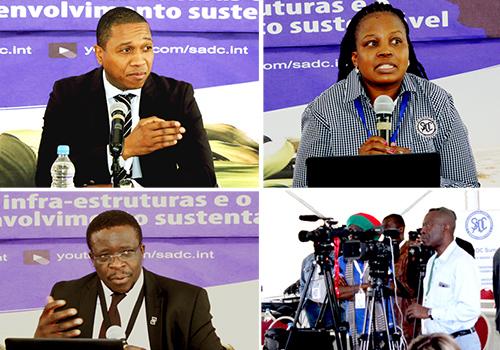The SADC Secretariat Directorates of Infrastructure and Services; Industrial Development and Trade; and the Organ on Politics, Defense and Security Cooperation took turns in briefing the media fraternities at the Safari Court and Hotel in Windhoek, Namibia on 12th August 2018.
The Media briefing were organized by the SADC Secretariat in collaboration with the Ministries of International Relations and Cooperation (MIRCO) and Information, Communication and Technology (MICT) of Namibia on the margins of the 38th SADC Summit of Heads of State and Government.
The objective of the Directorate’s Media briefings was to popularise implementation of SADC programmes, and the role played by Secretariat in implementing SADC programmes and Council decisions to the SADC citizens through the media.
The Director on Infrastructure and Services Ms. Mapolao Mokoena presented progress in the implementation of key policies, strategies and Council decisions in infrastructure programmes and services. She highlighted the functions of the directorate whose mandate is to facilitate and coordinate the transformation of the region into an integrated economy by promoting the provision of adequate, interconnected and efficient regional infrastructure. Ms Mokoena said that key activities under the Directorate are geared to support the Regional Indicative Strategic Development Plan (RISDP) 2015-2020 and the SADC Regional Industrialization Strategy and Road Map 2015-2063.
The Directorate of Infrastructure and Services comprises of the transport, ICT, meteorology, energy and water sectors. Ms. Mokoena also shared a presentation on project preparation initiatives, status of implementation of projects in water, energy, ICT/ telecommunications and transport sectors and soft infrastructure.
The SADC Director of Industrial Development and Trade, Mr Tapiwa Samanga focused his presentation on the implementation of the SADC Industrialization Strategy and the Revised RISDP. He said that the directorate undertakes its mandate through designated functions being; Industrialisation and Competitiveness; Value Chains; Trade; Science Technology and Innovation; Industrial Project Preparations; and Standards, Quality Assurance and Metrology.
He outlined the objectives of the directorate as enhancing SADC regional industrial competitiveness through manufacturing, industry, mining and other productive activities for effective participation in the global economy; as well as pursuing regional integration through the establishment of the SADC Free-Trade-Area, SADC Customs Union and the SADC Common Market.
Mr Samanga said that the SADC Industrialization Strategy and Roadmap (2015 – 2063) and Costed Action Plan were important tools which can transformation the economics of the SADC region through industrialization, modernisation, skills development, science and technology, financial strengthening and deeper regional integration.
Mr Samanga described the promotion of the SADC Industrialisation Strategy, Roadmap and its Costed Action plan in 8 Member States, namely: Angola, Botswana, Eswatini, Lesotho, Madagascar, Namibia, South Africa, and Zimbabwe, with the participation of stakeholders, including private sector and civil society as one of the milestones achieved by his directorate. He added that seven of the eight Member States were assisted to develop national indicative public coordination costs for implementing the Strategy.
Other milestones include the development of the SADC Protocol on Industry to provide the legal framework for co-operation on industrial development within and amongst the Member States of SADC to be validated end of September 2018.
In his presentation, the SADC Director of Organ on Politics, Defence and Security Cooperation, Mr Jorge Cardoso briefed the media on the mandate and activities of the Directorate whose strategic objective is to promote democratic governance, peace, security and regional integration. Mr. Cardoso said that the Directorate was guided by the revised Strategic Indicative Plan for the Organ (SIPO) in executing the its mandate.
He outlined the following as key milestones in the last financial year; the adoption of the SADC Law Enforcement and Anti-poaching (LEAP) Strategy; the deployment of the SADC Preventive Mission and Oversight Committee in the Kingdom of Lesotho; the continued support to peace and stability of the DRC, including SADC Electoral Advisory Council (SEAC); support and the invaluable work by the Force Intervention Brigade (FIB) under the UN Mission in the DRC (MONUSCO); as well as the SADC Organ support to the Republic of Madagascar through the work of the Special Envoy which continues to date.
The Director added that his directorate was prepared to support the SADC Member States holding elections in 2019 through deployment of SADC Electoral Observation Missions (SEOM), as well as supporting processes to promote democratic principles. Mr Cardoso told the media that the SADC region was peaceful and stable.

